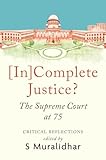Incomplete justice? The supreme court at 75 : Critical reflections / Edited by S Muralidhar
Publication details: New Delhi Juggernaut 2025Description: xxxix, 584 pages 24 cmISBN:- 9789353452926 (Hardback)
- 347.54035
| Item type | Current library | Shelving location | Call number | Materials specified | Status | Notes | Date due | Barcode | |
|---|---|---|---|---|---|---|---|---|---|
 BOOKs
BOOKs
|
National Law School | Faculty Publication - Display Area | 347.54035 MUR - 2 (Browse shelf(Opens below)) | HB | Not For Loan | Recommended by Prof. Dr. Arun K Thiruvengadam | 40370 | ||
 BOOKs
BOOKs
|
National Law School | General Stacks | 347.54035 MUR - 1 (Browse shelf(Opens below)) | HB | Checked out | Recommended by Prof. Dr. Arun K Thiruvengadam | 09.02.2026 | 40341 |
Chapter: Legal education and the supreme court/ Sankaran, Kamala
Part I: The court and its actors -
Part II: The court and criminal law: Practice and procedure –
Part III: The court and equity -
Part IV: The court and substantive laws -
Part V: The court, the bar and legal education –
22. Legal education and the supreme court by Kamala Sankaran -
Part VI: The court and the future.
India’s top legal minds on the issues that define justice In its seventy-fifth year, how should one view the Supreme Court of India – an institution that has not only transformed in its composition and functioning but has also been a catalyst for change in other branches of the State? How has it fared in terms of accountability, transparency and its responsibility to both the law and the people? Has it consistently managed to strike the delicate balance between judicial activism and the imperative of accountability in the exercise of judicial power?
To what extent has the Court fulfilled its role as a counter-majoritarian body capable of checking majoritarian impulses and the excesses of State power? Has it remained true to its constitutional mandate, interpreting the Constitution in the spirit of its foundational values – liberty, equality, fraternity and dignity? And how consistent has its jurisprudence been in defending these ideals?
This book brings together a range of voices – former judges, practicing lawyers, legal scholars, researchers and a journalist – to engage with these questions through a series of essays and interviews. Their reflections offer a critical exploration of the Supreme Court’s evolving role and functioning. This volume aims to foster meaningful dialogue and deepen public understanding of the Court’s challenges in retaining its legitimacy while striving to fulfill the constitutional promise of equal and fair justice.
There are no comments on this title.
